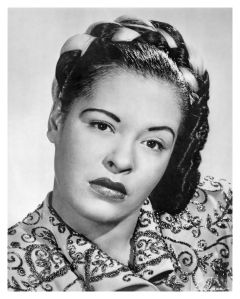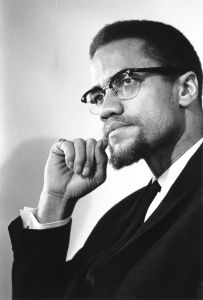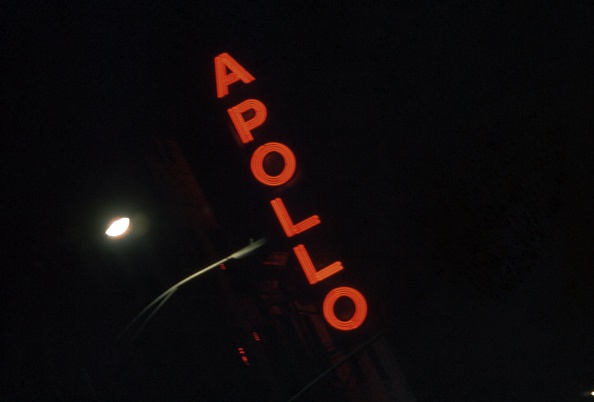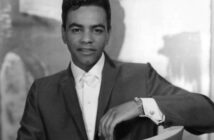Source: Donaldson Collection / Getty
The Apollo is Aretha Franklin, Stevie Wonder and Luther Vandross. It’s Lauryn Hill and Amateur Night where she was discovered. It’s Thelonius Monk and Max Roach. It’s Josephine Baker, Count Basie, Sammy Davis, Jr. and Cab Calloway.
The Apollo is Sam Cooke and Otis Redding! It’s Nat King Cole and John Coltrane!
It’s Ella Fitzgerald and Rosetta Tharp.
The Apollo is our cherished, targeted, brilliant, beautiful and beloved Billie.
And the Apollo is far more than these artists. Their names which conjure so much elegance and genius, barely scratched the surface of those who animated the Theater’s motto, made it muscular, made it ours: Where Stars Are Born And Legends Made.

Source: John D. Kisch/Separate Cinema Archive / Getty
Now 90 years on, the historic landmark and iconic cultural institution in Harlem, New York City, is reinventing itself—again. In the 1930’s it was called “Hurting and Seamon’s New Burlesque Theater” where the rule was clear, was a deep, sharp cut: NO. BLACKS. ALLOWED.
But then came a ban on burlesque, one which coincided with the razing of downtown Manhattan where Black people were lived / were kept. It had to change, they had to move. Macy’s was coming to town. But a man named Philip Payton, a Black real estate mogul who was and is considered the Father of Harlem, saw the forced migration as an opportunity. He opened up Harlem—which had been considered a white suburb of Manhattan, New York—to African Americans. And with their arrival, came the Harlem we know and love.

Source: Michael Ochs Archives / Getty
The Harlem of Malcolm. The Harlem of Langston Hughes. The Harlem that was the cultural center of the African diasporic world. The Harlem of the Apollo Theater. The Harlem of what will, in this new renaissance be called the Apollo Performing Arts Center.
The Rebirth
Already home to three performance spaces, the expansion of the landmark space has been 20 years in the making. It was the brainchild of former Apollo president and CEO, Jonelle Procope. According to Procope, the seed was planted when the Metropolitan Opera star Beverly Sills referred to the Harlem theaters as “the Lincoln Center of Uptown.”
Years of planning later, in 2023, when Procope announced her retirement and took her last official bow as president and CEO of the Apollo at the 2023 Apollo Spring Benefit Gala, she revealed the plans for the expansion and renovation to the audience. With this year’s Spring Gala taking place earlier this week, attendees were able to see the new face of the Apollo with its two new performing spaces, up close and personal. Their creation not only marks a new chapter for the Apollo but also represents a major inflection point in the storied history of the Apollo, ensuring it maintains its status as a cultural and artistic hub.
The new theaters at the Apollo have been named the Victoria Theater and the Apollo Victoria, both located in Harlem. The new spaces are set to provide a significant boost to the local arts scene and offer additional venues for diverse performances and cultural events.
The Vision
Located on 125th Street, just a few doors down from the Apollo’s main stage, the Victoria Theater will include a 199-seat theater and a 99-seat theater. It is designed to accommodate a variety of performances, including plays, concerts and community events, thereby enhancing the Apollo’s ability to host a wider range of programming.
Already this year, the Victoria has hosted a slew of events and performances, including “The Renaissance Mixtape” featuring Soul Science Lab. The Brooklyn-based hip-hop and educational duo crafted a multi-disciplinary presentation that included live instrumentation, rap, singing, dancing, video projection, and podcasting, that celebrated this year’s centennial celebration of the Harlem Renaissance. These types of performances illustrate Apollo’s vision of being an incubator space.
Procope’s vision also aligns with that of Kamilah Forbes, the Apollo’s Executive Producer. As she told the National Endowment For the Arts in 2022, she wanted the Apollo to be a destination that breeds variety and innovation.
“I want to see more diversity of thought, of aesthetics, of representation,” Forbes said. “We talk about it a lot. But I want to see it take place.” Well, it’s now taking place.
The Renaissance
The expansion of the Apollo Theater is significant for another reason. The opening of the new theaters is expected to help usher in a new Harlem Renaissance, a moment that could not be more urgent as the neighborhood has been a major target for gentrification. The Apollo becoming a large-scale hub for Black performers and creatives of various levels and styles will not only encourage Black patrons to come, but galvanize up-and-coming artists to flock there to be part of a new communal hotbed of creativity.
More, the new theaters are anticipated to boost the local economy by attracting more visitors and tourists to Harlem. The Victoria is located inside a Marriott Renaissance Hotel, providing a convenient resting place for attendees to remain in the heart of Harlem.
The expansion is slated for completion in 2025, when Apollo Theater’s mainstage finishes a renovation. Thanks to a $70 million capital campaign, the lobby of the theater will be grown to include a gift shop.
As the Apollo Theater opens its new doors, it reaffirms its position as a leading cultural institution that not only honors its rich heritage but also looks forward to a vibrant and inclusive future. In recent years, the Apollo has been host to multiple-day celebrations and festivals, including its annual Africa Now! Festival, and last year’s star-studded, Ta-Nehisi Coates-curated Festival of Arts and Ideas. Now, with the mainstage, the Apollo Club Cafe, and the Victoria, possibilities for larger-scale events are endless.
But what’s happening on 125th street in Harlem should likely less be characterized as an expansion than as a promise to Black culture and entertainment. It should likely be characterized as a testament to the enduring legacy of this gift from and to Black America and all her neighbors.
SEE MORE:
Showtime At The Apollo Performances You Should Never Forget
Wendell Pierce Says White Landlord Denied Him An Apartment, Draws Attention To Fearless Fund Case
11 photos



